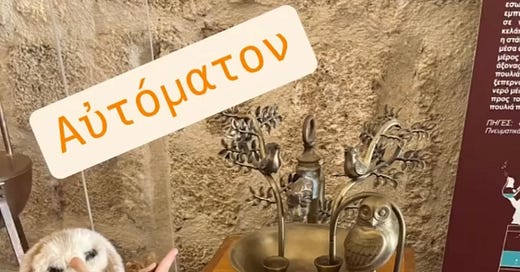Dear Classical Wisdom Kids,
Welcome to our Ancient Greek Word of the Week! It’s a great opportunity to learn new words... but more often than not, we actually get to learn about where the words we already know come from. The remarkable thing is when ideas and concepts that seem so modern turn out to be ancient.
[Hint: It happens WAY more than you think!]
So read on for this week’s ancient word - it’s one you’ll automatically enjoy!
All the best,
Anya Leonard
Founder and Director
Classical Wisdom
P.S. Check out the activities below...
Greeking Out On Automagic
By Eugenia Manolidou, Elliniki Agogi
Αὐτόµατον: Automaton
In the labyrinth of the Greek language, there exists a powerful, almost magical word that has woven its way into countless languages and cultures... and it’s not one you might have ‘automatically’ known is Greek!
It is the word «Aὐτόµατον» (automaton), pronounced in Greek as “aftómaton,”but it also goes by the nickname “auto”.
Despite its simplicity, this little word holds the key to understanding machines and ideas that shape our modern world.
It is an ancient word found in the works of the poets Hesiod and Homer and it serves as the base for so many concepts that have changed the way we look and interact with our surroundings. Let's see a few!
The most immediate word that comes to mind is of course “automatic” itself. From automatic doors that swing open as you approach, to automatic transmissions in automobiles that shift gears, this term includes the idea of self-regulation and efficiency.
In the world of industry and technology, the word has given rise to the field of automation. Factories, processes, and even homes are now equipped with automated systems that function without us humans having to do much, making our lives and work much easier! The idea of automation has become essential in so many different types of jobs, from manufacturing to information technology.
In ancient Greece, “automata” were marvels of engineering, showcasing the ingenuity of ancient inventors like Ctesibius and Hero of Alexandria. These early automata paved the way for the amazing machines and robots that we have today.
Self-driving cars are guided by automatic navigation systems, while planes use “autopilot” where they can fly almost completely by themselves. This idea has extended metaphorically to our daily lives, describing moments when we do routine tasks without thinking about them.
In the world of linguistics, the word has given birth to terms like “automaticity”, describing the ability to perform tasks without conscious effort. Language learners, for example, strive for automaticity in vocabulary recall and grammatical structures, so they can talk in another language.
So today, let's celebrate the automagicians - engineers, inventors, and dreamers - who continue to push the boundaries of what is possible. Because, with each breakthrough, we are not just witnessing progress...we are part of a great legacy that began with the ingenious minds of antiquity.
As you go about your day, surrounded by the automagic marvels that have become an integral part of our existence, take a moment to appreciate how ancient wisdom and modern ingenuity have come together.
Activities
Practice writing!
Print out this traceable to write out the ancient Greek word:
Automagic Word Creations:
Create your own "automagic" words by combining "auto" with other root words or concepts. Illustrate creatively and define your invented words, exploring your language further.
Automagic Art Collage:
Provide magazines, newspapers, and art supplies for a collage activity. Ask students to Create an "Automagic Art Collage" by finding and cutting out images from magazines and newspapers related to automation, technology, and magical elements. Discuss about the interconnectedness of ancient wisdom and modern innovations.
Automagic History Project (for teachers):
Encourage students to research and create a project on the history of automata in ancient Greece. They can make posters, presentations, or even dioramas showcasing the ingenious automata inventions from that era. This project promotes historical understanding and research skills.
If you want to watch Owly try out some ancient machines, and get inspired for the activities, you can do so here:
Postcard from... Rhodes’ Ancient Invention Museum
Hello guys and girls, Welcome to today’s adventure around a teeny-tiny museum in Rhodes. (Don’t worry, it’s not a museum about roads.) Actually, it’s a museum about ancient inventions. First of all, Rhodes is an island in Greece. The museum is inside the walls of the old town. The walls were used in ancient times to protect the city. Whenever an army wo…








